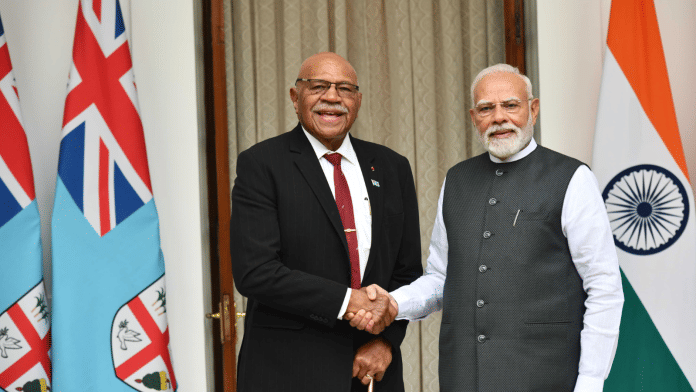New Delhi: Fiji Prime Minister Sitiveni Rabuka’s India visit marks a full circle for the visiting dignitary as he was at the heart of a military coup nearly four decades ago that plunged bilateral ties to a nadir.
The year was 1987 when Rabuka, then a Lieutenant Colonel, had ousted the democratically elected government in his country. That episode ended with the expulsion of Indian diplomat T.P. Sreenivasan, who was given a 72-hour deadline to leave the South Pacific country in 1989.
Two years ago, Rabuka had apologised to the Indo-Fijian community for the coup and sought for forgiveness. “I make this confession on my own behalf and on behalf of all those who took part with me in the military coup on the 14th of May, 1987. We confess our wrongdoings, and we confess that we have hurt so many of our people in Fiji, particularly those of the Indo-Fijian community,” he had tweeted in May 2023.
As for his Indian connection, Rabuka holds a Masters Degree in Military Science from Madras University in India in 1979. He is a graduate of the Indian Defence Services Staff College, Wellington, Tamil Nadu.
On Monday, Rabuka held wide-ranging talks with his Indian counterpart Narendra Modi at Hyderabad House in his first visit to the country as the Fiji prime minister.
“The leaders reaffirmed the deep-rooted and long-standing relationship and strong people-to-people ties between India and Fiji. They acknowledged the contribution of the Girmitiyas, over 60,000 Indian indentured labourers who arrived in Fiji between 1879 and 1916, in shaping Fiji’s multicultural identity, diverse society and economy,” a joint statement read.
For New Delhi, Rabuka’s visit signals its ongoing engagement in the Pacific Islands, especially as China continues to deepen its footprint across the region. Over a decade ago, Prime Minister Modi launched the Forum for India-Pacific Island Countries (FIPIC) in the Fijian capital of Suva, as the multilateral meeting between New Delhi and other leaders within the region.
As many as 14 Pacific Island countries attended the first FIPIC in Suva in 2014. Two further forums have been held, including one in Jaipur in 2015 and most recently during Modi’s visit to Papua New Guinea in 2023.
Fiji is home to a large number of people with Indian origin, with the ties dating back to 1879 during British colonisation when indentured labourers were brought to work on sugar plantations. Today, Indo-Fijians make up one of the largest ethnic groups in the country—the Indian origin population constitutes roughly one-third of the total population, which stood at around 900,000 in 2017. Fiji-Hindi is one of the national languages of the country.
Girmit Remembrance Day is a public holiday in Fiji to honour the arrival of the first ship of indentured labourers, or ‘Girmitiyas,’ from India in 1879. From then till 1916, more than 60,000 Indians were brought to Fiji to work under the indenture system until 1920, when it was abolished.
Also Read: Canada joins a tiny list of countries from which Indian envoys have been withdrawn or expelled
The tumultuous period
Right from 1948, India had a post of Commissioner in Fiji and it was later upgraded to High Commissioner after the country’s independence from the UK in 1970. Fiji’s Prime Minister Ratu Sir Kamisese Mara visited India in 1971, while Prime Minister Indira Gandhi visited the country a decade later.
The bilateral ties became strained in 1987, when the military coup took place in Fiji under the watch of Rabuka to protect the interests of the Indigenous Fijians due to his dissatisfaction with the elected leader, then Prime Minister Timoci Bavadra, an Indo-Fijian leader. The coup was partly related to the domination of Indo-Fijians in the government.
Targeted violence against the Indo-Fijian community led to thousands fleeing the country. The then Indian Prime Minister, Rajiv Gandhi, brought up the matter in the United Nations and asked for the country to be expelled from the Commonwealth of Nations.
In 1989, Rabuka retaliated, and ordered the then High Commissioner, T. P. Sreenivasan, to leave the country. After the coup, the Indian Cultural Centre in Fiji was also closed down in 1990. Eventually, the High Commission post was reopened in May 1999 and the ICC in February 2005. Fiji sent their High Commission to India in 2004.
“Though I was his adversary, Rabuka was never disrespectful to me during the two years I spent there after the coup. Moreover, he did not object to my visit to Fiji on the invitation of an Indian organisation in 2014,” Sreenivasan wrote in an article published in Rediff. “He even invited me to a game of golf and lunch. He told me that since both of us were private citizens now, we should have no animosity to each other.”
“Neither of us had any idea that he would become prime minister again with the support of Fiji Indians,” he added.
Eventually as Fiji returned to democracy, so did Rabuka. In 2022, the incumbent Prime Minister led the opposition alliance to power. Frank Bainimarama, the former Prime Minister, lost power after almost 16 years as the leader in Suva, to a coalition led by Rabuka.
India has in the last decade also increased its developmental assistance to Suva. During Modi’s visit in 2014, India extended a line of credit for $75 million, apart from agreeing to cooperate in the training of diplomats as well as earmarking land for respective diplomatic missions.
External Affairs Minister S. Jaishankar visited the country in 2023, which also saw a number of projects launched including the solarisation of the Heads of State residence. President Droupadi Murmu visited Fiji in August 2024.
(Edited by Tony Rai)
Also Read: India offers $500,000 in relief to quake-hit Vanuatu. China sends supplies, engineering team






